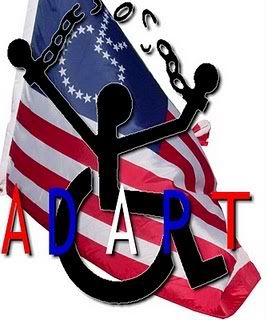I spent a year of my life doing an independent study where I planned a disability awareness workshop for the students in my department. Why did I feel the need to do this? Here is a chunk from another post back in Jan:
"If you poll a bunch of family studies majors as to what their future career goals are, a popular answer is working with special needs children. Then poll a few family studies majors as to what the first thought is that comes to mind when they hear the word disability (as was done a year and a half ago). You get answers such as the elderly, people who cannot work, young children, and people in wheelchairs. My first thought to that? What the hell am I then? My department is small. We take classes with the same people over and over. Even if they don’t know my name, I would be willing to bet that 90% of family studies students know who I am. I’m hard to miss, being the token gimp and all. I am a 23-year-old college student in a very structured pre-professional university program, who just happens to have CP and bipolar disorder. I am neither elderly nor a young child. I do not work now, but I am a full time student and I volunteer 1-2 days a week. I will of course work after I have my degree. There is no reason why I should not be working. As to the wheelchair thing, I’m on the fence with that one. I happen to have 2 wheelchairs in my possession, but I don’t use them all that often.
"My second thought? I would not want any of you working with my (fictitious) disabled child. In fact it scared me half to death to think that people being trained in the human services are left to go out into the real world with no real knowledge of disability whatsoever. My classic example? Say you don’t want to work with the special needs population at all, say you want to work in crisis intervention. Say you work at a battered woman’s shelter and a woman comes in with her son who is autistic. What then?"
During that time I also took a class with possibly one on the most offensive textbooks I have ever seen. I don't have the book with me, so this is not an exact quote, but in the chapter that discusses understanding where both you and your client are comming from, there was a sentence to the efffect of, 'your client may be fat or thin, young or old, rich or poor, physically or mentally handicapped or whole' The part I bolded is a dirrect quote. I could never forget that. A friend of mine from home congratulated me on being part of a person. I spoke up. My department is changing the book for this fall.
This summer I'm taking adolescent psyc. The course started Tuesday. The first thing I did when I opened the book was flip to the index and look up disability. On the one page that anything is mentioned, it is insinuated that all PWDs are stupid. I even brought the book to my shrink today and had her read it. I wanted to know if I was being over sensitive. After putting it in context with what came before and after in the chapter, she agreed. Again, I don't have the book with me at the moment. I wish I did so I could quote it. The only place disability is mentioned in the book is in chapter on education. The focus was learning disabilities with a gigantic focus on ADD. What about everybody else? Do we not exist? Also, what really bothers me is that there is nothing mentioned about the socioemotional impact of disability during adolescence. I feel based on personal experiance and observation that the impact during this time in particular is incredibly signifigant Why aren't people learning this?
Apparently the first book I mentioned is rather groundbreaking. At least they tried (however unsuccessfully). We're mentioned continuously throughout that book as a distinct group. Not so in the adolescent psyc book. That focuses exclusively on culture (ie race/country of origion). Um, disability is a distinct culture too.
Then the other night after stewing on this for a couple of hours I remembered that my human sexuality book has a 2 or 3 paragraph mention about CP in the chapter discussing sexual disfunction. To the extent of my knoweldge, that's a blatent falicy. CP requires being creative when it comes to sex. So does spina bifida, SCI, and a host of other disabilities. Did I miss the memo that stated that creativity is the same thing as dysfunction? Because I thought they were completely different. I mentioned this to my shrink today as well? She asked me if it was true. I sid a real quick "no." It is so easy to cause damage. If you don't know any better...
I'm angry and I'm upset and I'm saddened about the whole thing. No wonder the students in my department have such a narrow misguided view of what disability is. Look at how they are being taught. I think any one of you would also be frightened at the thought that they are all going out into the world to help PWDs having this background.
What needs to be done (I think) is a 2 pronged approach. The first would focus on college students. Get to human services professionals, medical professionals, teachers, etc. before they go out in the field. To do this you absolutely have to target professors, which means getting a lot of research done. They like hard evidence. It's what they'll listen to. The other side of the coin is to focus on young children. Make it so that by the time they go out in the world this stuff is second nature. A no brainer. Like racism. People are always going to be racist, people are always going to be ableist, but look at the percent of people that are racist vs 40 years ago. What did it? I think a lot of it has to do with exposure. Most people don't have to learn not to be racist now, they just get it. Wouldn't that be nice if eventually we didn't have to do things like workshops? This would involve a lot of community outreach.
But why should anyone else try to do this if I won't even do it? So I do... It's the most important thing that I do. My hope is that others do too. It's 2008. Things shouldn't be like this; but they are. Things desperately need to change.

















0 comments:
Post a Comment